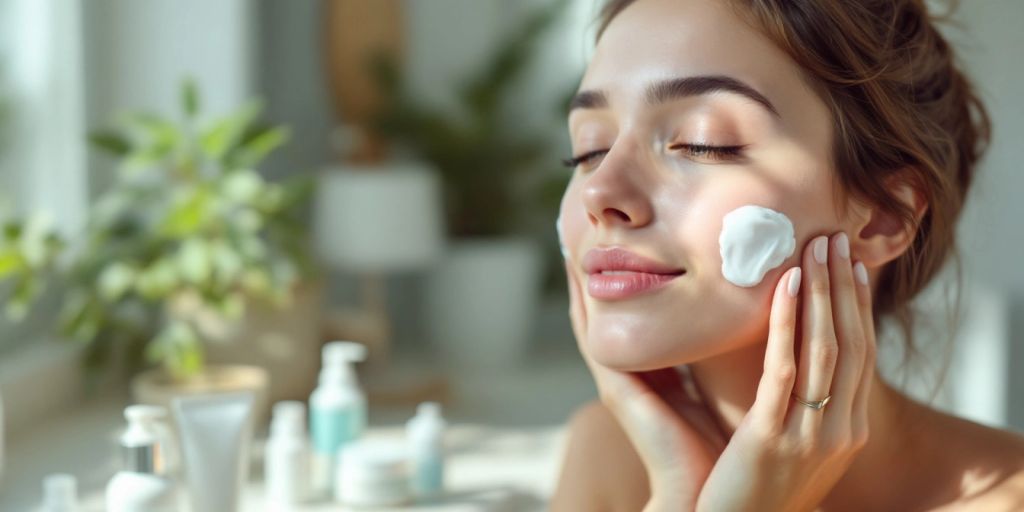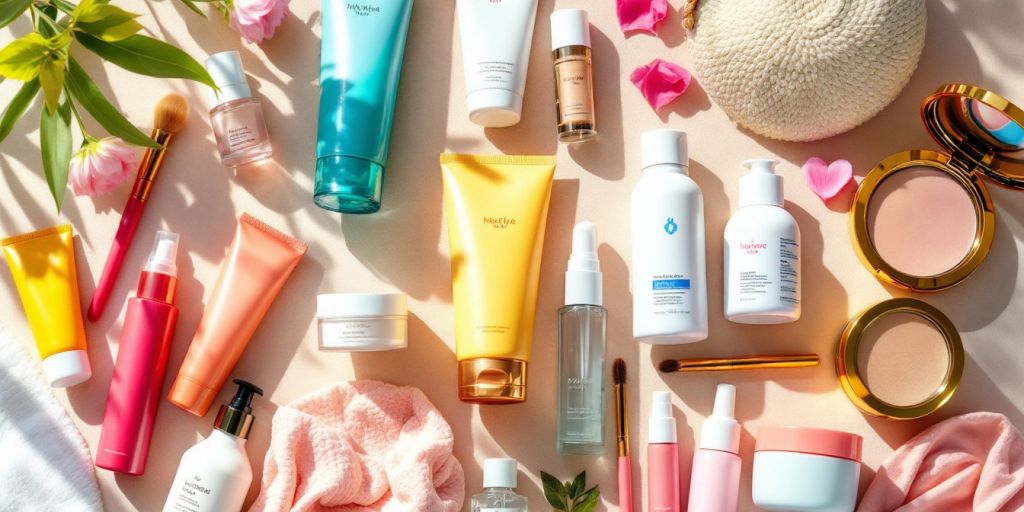Effective Strategies on How to Treat Acne in Malaysia
Understanding the Causes of Acne in Malaysia

Acne, or Acne Vulgaris, is a common skin condition that affects many people in Malaysia. Understanding its causes is crucial for effective treatment.
Hormonal Imbalances and Acne
Hormonal changes, especially during puberty, can lead to increased production of androgens like testosterone. This results in more oil (sebum) being produced by the skin, which can clog pores and lead to acne.
Dietary Factors Influencing Acne
Certain foods can worsen acne. High-glycaemic foods, like sugary snacks, can spike insulin levels, leading to more oil production. Dairy products are also linked to increased acne symptoms. Here are some dietary tips:
- Limit sugary snacks and drinks.
- Incorporate more fruits and vegetables.
- Stay hydrated with water.
Environmental Triggers of Acne
In Malaysia, the hot and humid climate can exacerbate acne. Sweat and humidity can lead to clogged pores. Additionally, stress can increase cortisol levels, which may worsen acne.
Managing stress through relaxation techniques can help reduce acne flare-ups.
By understanding these causes, individuals can take proactive steps to manage their acne effectively. Remember, a balanced approach combining skincare, diet, and stress management is key to maintaining clear skin.
Effective Over-the-Counter Treatments for Acne

Acne can be a frustrating issue, but there are effective over-the-counter (OTC) treatments available that can help manage it. Here are some popular options:
Benzoyl Peroxide and Its Benefits
Benzoyl peroxide is a powerful ingredient that works by killing acne-causing bacteria and reducing inflammation. It helps to unclog pores and is available in various forms, including gels and creams. Start with a lower concentration to see how your skin reacts.
Salicylic Acid for Acne Treatment
Salicylic acid is another common OTC treatment. It helps to exfoliate the skin and clear out clogged pores. This ingredient is particularly effective for blackheads and whiteheads. Look for products that contain 0.5% to 2% salicylic acid for best results.
Sulphur-Based Products for Acne
Sulphur is known for its ability to absorb excess oil and reduce redness. It can be found in masks and spot treatments. Many users find that sulphur-based products help to dry out pimples quickly, making them a great option for emergency use.
Quick Tips for Using OTC Treatments:
- Start Slowly: Introduce one product at a time to avoid irritation.
- Follow Instructions: Always read the label for application guidelines.
- Moisturize: Use a non-comedogenic moisturizer to keep your skin hydrated.
Remember, consistency is key! Regular use of these treatments can lead to clearer skin over time.
Highlighted Products:
| Product Name | Key Benefit |
|---|---|
| Acne Act Post Acne Spot Serum 30ml | Targets post-acne spots, reducing hyperpigmentation in 2 weeks. |
| Acne Act Post Acne Spot Serum 30ml | Helps diminish redness caused by acne effectively. |
By incorporating these OTC treatments into your skincare routine, you can take significant steps towards managing your acne effectively. Always consult with a dermatologist if you have severe acne or if OTC treatments do not work for you.
The Role of Prescription Medications in Acne Management
Topical Retinoids for Acne
Topical retinoids are a popular choice for treating acne. They work by promoting skin cell turnover and preventing clogged pores. Using retinoids can significantly improve your skin’s texture and reduce breakouts. Some common options include:
- Tretinoin: Effective for reducing acne and improving skin texture.
- Adapalene: A gentler option that is available over-the-counter.
- Tazarotene: Stronger and often used for more severe cases.
Antibiotics for Severe Acne
For more severe acne, dermatologists may prescribe antibiotics. These medications help reduce inflammation and bacteria on the skin. Here are some commonly prescribed antibiotics:
- Doxycycline: Often used for its anti-inflammatory properties.
- Minocycline: Known for its effectiveness against acne bacteria.
- Clindamycin: A topical option that can be used alongside other treatments.
Isotretinoin for Persistent Acne
Isotretinoin is a powerful medication for severe, persistent acne that hasn’t responded to other treatments. It works by reducing oil production and preventing clogged pores. However, it comes with potential side effects, so it’s crucial to discuss this option with a dermatologist. This medication can lead to clear skin for many individuals.
Remember: Always consult with a dermatologist before starting any prescription medication for acne. They can help tailor a treatment plan that suits your specific needs and skin type.
In summary, prescription medications play a vital role in managing acne, especially for those with moderate to severe cases. By understanding the options available, you can work with your healthcare provider to find the best treatment for your skin.
Natural Remedies and Alternative Treatments for Acne
Herbal Treatments for Acne
Using herbs can be a great way to treat acne naturally. Two powerful herbs known for their anti-acne properties are scent leaf (Ocimum gratissimum) and neem (Azadirachta indica). These herbs have been shown to reduce inflammation and fight bacteria on the skin. You can make a paste from these herbs and apply it directly to the affected areas for relief.
Essential Oils for Acne-Prone Skin
Essential oils can also help manage acne. Here are some popular options:
- Tea Tree Oil: Known for its antibacterial properties, it can be applied directly to pimples.
- Lavender Oil: Helps soothe the skin and reduce redness.
- Rosemary Oil: Has anti-inflammatory effects that can calm irritated skin.
Home Remedies to Soothe Acne
There are simple home remedies you can try:
- Honey and Cinnamon Mask: Mix honey and cinnamon to create a paste. Apply it to your face for 10-15 minutes before rinsing.
- Aloe Vera Gel: Apply fresh aloe vera gel to your skin to reduce inflammation and promote healing.
- Green Tea: Brew green tea, let it cool, and use it as a toner to help reduce oiliness.
Natural treatments can be effective, but it’s important to remember that results may vary. Always do a patch test before trying new remedies.
By incorporating these natural remedies into your skincare routine, you can help manage acne effectively and promote healthier skin overall. Stay consistent and patient for the best results!
The Impact of Diet and Lifestyle on Acne
High-Glycaemic Foods and Acne
A diet high in glycaemic foods can worsen acne. Foods like white bread, sugary snacks, and soft drinks can spike insulin levels, leading to increased oil production and inflammation. Avoiding these foods can help manage acne.
Benefits of a Balanced Diet
Eating a balanced diet rich in fruits, vegetables, lean proteins, and healthy fats can support skin health. Here are some key nutrients:
- Vitamins A, C, and E: Help reduce inflammation.
- Zinc: Supports skin healing.
- Omega-3 fatty acids: Help regulate oil production.
Exercise and Hormonal Regulation
Regular exercise is essential for managing acne. It helps regulate hormones and reduces stress, which can trigger breakouts. Aim for at least 30 minutes of physical activity most days of the week.
Maintaining a healthy lifestyle is crucial for clear skin. Simple changes in diet and exercise can make a significant difference in acne management.
In summary, focusing on a balanced diet and regular exercise can greatly impact acne treatment. Influencers like @skincarebyhyram emphasize the importance of these lifestyle choices in their skincare routines. By making these adjustments, you can work towards clearer skin and improved overall health.
Skincare Routine Tips for Acne-Prone Skin
Gentle Cleansing Practices
Start your day with a gentle cleanser. Use a non-comedogenic product that won’t clog your pores. Cleansing twice daily helps remove dirt and excess oil. Influencers like @skincarebyhyram recommend avoiding harsh scrubs that can irritate your skin.
Importance of Moisturizing
Even if your skin is oily, moisturizing is crucial. Opt for lightweight, oil-free moisturizers. This keeps your skin hydrated without adding extra oil. Remember, hydrated skin can help reduce acne flare-ups.
Using Sunscreen to Prevent Acne
Never skip sunscreen! A broad-spectrum sunscreen with at least SPF 30 protects your skin from harmful UV rays. Look for non-comedogenic formulas to avoid clogging your pores. Influencers often stress the importance of sun protection in their skincare routines.
Quick Tips for a Healthy Routine:
- Cleanse your face twice a day.
- Moisturize daily, even if you have oily skin.
- Apply sunscreen every morning, rain or shine.
- Avoid touching your face to minimize bacteria spread.
- Exfoliate gently once or twice a week to remove dead skin cells.
Maintaining a consistent skincare routine is key to managing acne effectively. Small changes can lead to significant improvements in your skin’s health.
Professional Treatments and Procedures for Acne
Acne can be tough to manage, but there are several professional treatments available that can help clear your skin effectively. Here are some of the most common options:
Chemical Peels for Acne
Chemical peels involve applying a solution to the skin that helps remove dead skin cells and unclog pores. This treatment can reduce acne and improve skin texture. Regular sessions can lead to clearer skin.
Laser Therapy for Acne Scars
Laser therapy is a popular choice for treating acne scars. It works by targeting the deeper layers of skin to promote healing and collagen production. Many influencers recommend this for long-term results.
Microdermabrasion for Clear Skin
Microdermabrasion is a non-invasive procedure that exfoliates the skin, removing the top layer of dead skin cells. This can help reduce the appearance of acne scars and improve overall skin tone.
Summary Table of Treatments
| Treatment Type | Benefits | Recommended Frequency |
|---|---|---|
| Chemical Peels | Reduces acne, improves texture | Every 4-6 weeks |
| Laser Therapy | Targets scars, promotes healing | Every 6-12 weeks |
| Microdermabrasion | Exfoliates, improves tone | Monthly |
Remember: Always consult with a dermatologist to find the best treatment for your skin type and condition.
These professional treatments can be very effective, especially when combined with a good skincare routine. Don’t hesitate to reach out to a dermatologist for personalized advice!
Psychological Effects of Acne and Coping Strategies
Impact of Acne on Self-Esteem
Acne can significantly affect a person’s self-esteem. Many individuals feel embarrassed or self-conscious about their skin, leading to social withdrawal. Studies show that skin conditions like acne can impact a person’s quality of life, especially in terms of psychology. Influencers like Emma Chamberlain have openly discussed their struggles with acne, helping to normalize these feelings and encourage others to seek support.
Dealing with Acne-Related Stress
Managing acne can be stressful. Here are some tips to cope with the stress:
- Practice mindfulness: Techniques like meditation can help reduce anxiety.
- Stay active: Regular exercise can boost your mood and reduce stress levels.
- Connect with others: Talk to friends or join support groups to share experiences.
Support Groups for Acne Sufferers
Support groups can be a great way to connect with others facing similar challenges. Here are some benefits:
- Shared experiences: Hearing others’ stories can provide comfort.
- Advice and tips: Members often share effective coping strategies.
- Emotional support: Being part of a community can help reduce feelings of isolation.
Remember, you are not alone in this journey. Many people face similar challenges, and seeking help is a sign of strength. Coping with acne is a process, and finding the right support can make a significant difference in your mental well-being.
Preventing Acne Flare-Ups and Maintaining Clear Skin
Maintaining clear skin is all about consistency and smart choices. A daily skincare routine is essential! Here are some effective strategies:
Daily Skincare Routine
- Cleanse Gently: Use a gentle, non-comedogenic cleanser to wash your face twice a day. This helps remove dirt without irritating your skin.
- Moisturize: Even if you have oily skin, moisturizing is crucial. Opt for lightweight, oil-free moisturizers to keep your skin hydrated.
- Sunscreen: Always apply a broad-spectrum sunscreen with at least SPF 30 to protect your skin from harmful UV rays.
Avoiding Common Triggers
- Touching Your Face: Avoid touching your face to minimize the spread of bacteria.
- Harsh Products: Stay away from products with harsh ingredients that can irritate your skin.
- Diet Choices: Limit high-glycaemic foods and sugar to help reduce flare-ups.
Lifestyle Tips
- Stay Hydrated: Drink plenty of water to keep your skin healthy.
- Regular Exercise: Physical activity helps regulate hormones and reduce stress, both of which can impact acne.
- Consult a Dermatologist: If you struggle with persistent acne, seek professional advice for tailored treatments.
Remember, consistency is key! Following these tips can help you maintain clear skin and prevent future flare-ups.
By incorporating these practices into your daily life, you can achieve healthier skin and boost your confidence. Influencers like starex – pagieh have shared their success with routines that include gentle cleansing and regular skincare practices, proving that a little effort goes a long way!
Understanding Different Types of Acne
Acne can appear in various forms, each with its own unique symptoms and treatment needs. Identifying the type of acne is essential for effective treatment. Here are the main types:
Comedonal Acne: Whiteheads and Blackheads
- Description: These are small bumps on the skin caused by clogged hair follicles.
- Appearance: Whiteheads are closed, while blackheads are open at the surface.
- Treatment Tips: Use gentle exfoliants and consider salicylic acid products to help clear pores.
Inflammatory Acne: Papules and Pustules
- Description: This type is marked by red, swollen lesions that can be painful.
- Appearance: Papules are solid and raised, while pustules contain pus.
- Treatment Tips: Over-the-counter treatments like benzoyl peroxide can be effective.
Cystic and Nodular Acne
- Description: Cystic acne is severe, characterized by large, painful nodules beneath the skin.
- Appearance: These can leave scars and are often deep and inflamed.
- Treatment Tips: Consult a dermatologist for potential prescription medications like isotretinoin.
Understanding these types can help you choose the right treatment and improve your skin health.
Summary Table of Acne Types
| Type of Acne | Symptoms | Treatment Options |
|---|---|---|
| Comedonal Acne | Whiteheads, Blackheads | Exfoliants, Salicylic Acid |
| Inflammatory Acne | Papules, Pustules | Benzoyl Peroxide, Topicals |
| Cystic/Nodular Acne | Deep, painful nodules | Prescription Medications |
By recognizing the type of acne you have, you can better manage your skincare routine and seek appropriate treatments. For personalized advice, consider consulting a skincare professional, as highlighted in the ultimate guide to building a skincare routine.
Consulting Dermatologists and Seeking Professional Help
When dealing with acne, consulting a dermatologist is crucial. They can provide tailored advice and treatments that suit your specific skin type and condition. Here’s what you need to know:
When to See a Dermatologist
- If over-the-counter treatments aren’t working after a few weeks.
- If you have severe acne that causes pain or scarring.
- If you notice sudden changes in your skin or new types of acne.
What to Expect During a Consultation
- A thorough examination of your skin.
- Discussion of your medical history and any previous treatments.
- Recommendations for a personalized treatment plan, which may include medications or skincare products.
Questions to Ask Your Dermatologist
- What type of acne do I have?
- What treatments do you recommend and why?
- How long will it take to see results?
- Are there any side effects I should be aware of?
Seeking professional help can make a significant difference in managing your acne effectively. Remember, the right treatment can lead to clearer skin.
For those in Malaysia, consider clinics that have received positive reviews, such as those listed in the 85 best acne treatment in Malaysia guide. Products like the Doclab Spot Killer V2 and Peramide Cream are also popular among influencers for their effectiveness in treating acne.
By consulting a dermatologist, you can find the best path to clear skin and regain your confidence!
The Role of Technology and Apps in Acne Management
In today’s digital age, technology plays a significant role in managing acne. With the rise of mobile apps and online resources, individuals can now take charge of their skincare routines more effectively than ever before.
Acne Tracking Apps
Using apps can help you monitor your skin’s progress. Here are some popular features of acne tracking apps:
- Photo Journals: Document your skin’s condition over time.
- Symptom Tracking: Log breakouts and triggers to identify patterns.
- Treatment Reminders: Get notifications for applying treatments or medications.
Telemedicine for Acne Treatment
Telemedicine has made it easier to consult with dermatologists without leaving home. This is especially useful for those in remote areas. Here’s how it works:
- Schedule a Virtual Appointment: Use an app to book a consultation.
- Share Your Skin History: Upload photos and describe your symptoms.
- Receive a Treatment Plan: Get personalized advice and prescriptions.
Online Support Communities
Connecting with others who face similar challenges can be empowering. Online communities offer:
- Emotional Support: Share experiences and coping strategies.
- Expert Advice: Access tips from skincare influencers and dermatologists.
- Resource Sharing: Discover new products and treatments recommended by peers.
Technology not only provides tools for tracking and treatment but also fosters a sense of community among acne sufferers.
In conclusion, leveraging technology and apps can significantly enhance your acne management journey, making it easier to achieve clearer skin.
Technology and apps play a big part in helping people manage acne. With just a few taps on your phone, you can track your skin’s progress, find helpful tips, and connect with experts. If you’re looking for the best tools to help with your skin, visit our website for more information!




